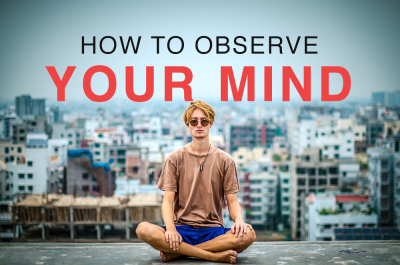

by Allie Stark, Collective Evolution
We are taught from a very young age that regular exercise and nutrient-dense foods are the recipe for a long and healthy life. What we are not often taught is how our overall health, well-being, and behaviours are deeply impacted by our ability to observe our mind and our thoughts. In this entry, I will share information with you about the power of your thoughts and some simple steps for you to begin observing your mind.
I have been working with a client who is trying to implement more exercise and movement into her everyday life. Given her current work hours, we decided that she could commit to walking to and from work twice a week in order for exercise to be interwoven into her current schedule. For the first few weeks, it went really well. However, last week she shared with me that on both of her walks, she had been confronted by strangers on the street directing overwhelmingly vulgar, racist, and hateful comments toward her.
This is a woman who was quietly minding her own business, trying to break a sweat while improving her self-care and feelings of self-worth.
As she told me this story, I began to notice the frantic, intense nature of my thoughts and how they began impacting my feelings and physical body. My chest felt tight and hot, my heart felt closed, and my head started to pound. How are we supposed to comprehend that injustice, inequality, sexism, ageism, classism, lookism, ableism, heterosexism, religious intolerance, and, specific to our current moment in time, racism, still exist in our world with outrageous thunder?
Mindfulness is defined as moment-to-moment awareness, without judgment. Presence is the practice of being in the now, becoming aware of our thoughts and creating space between these thoughts and our reaction(s) to them. These practices are well researched, and scientific studies have proven over and over again that practicing mindful awareness, or simply observing our minds, has a powerful impact on our overall health.
One of the earliest studies on mindfulness and how it affects the brain and the immune system was led by Richard Davidson, Ph.D., in 2003 at the University of Wisconsin–Madison. The study looked at how an eight-week mindfulness-based stress reduction course led by Jon Kabat-Zinn altered the brain and immune cells of the participants.
The participants of both the experiment group and control group were asked to assess how they felt throughout the course of study in addition to having the electrical activity in the prefrontal cortex of the brain (an area specialized for certain kinds of emotion) measured. What the researchers uncovered was twofold:
- The experiment group showed increased activation in the prefrontal cortex (therefore reducing anxiety and increasing positive emotional states), whereas the control group did not.
- Immediately after the eight weeks, both the experiment and control group were administered flu vaccinations. Four weeks later, researchers tested for flu antibodies in both groups and found that the individuals implementing a meditation practice after the course had far more antibodies than the participants of the control group.
Want to really drop your jaw? Check out the remarkable study conducted at UCLA that vividly demonstrates how a similar eight-week course helped to slow the progression of HIV for people with the disease.
Reading through these experiments I can’t help but think of the following quote by Leon Brown:
“It all begins and ends in the mind. What you give power to has power over you.”
When we begin the process of observing our minds and separating ourselves from our thoughts and feelings, we are able to clearly see that we are not our thoughts or our feelings. Rather, our experience becomes whatever we become attached to: the endless chatter and dramatic saga that we’ve made up in our minds or the reality of the present moment.
Here are my 7 simple steps to observing your mind:
- Close Your Eyes: It’s important to remove external distractions so you can truly become aware of what is happening inside.
- Take Five Deep Breaths: Breathing allows you to become grounded and gain clarity.
- Notice Your Thoughts: What thoughts come in and what thoughts go out?
- Observe Your Brain Chatter: Notice the frequency, rhythm, and pattern of your thoughts.
- Let Go of Self-Identification: Thoughts come and thoughts go. Imagine that your thoughts are like leaves falling onto a moving river. How are you identifying with your thoughts and allowing them to impact your sense of self and well-being?
- Take Five More Deep Breaths: Trust me, it won’t hurt.
- Notice That You Are Still Not Your Thoughts!
When I walk myself through these steps, the enormity of such nonsensical hate doesn’t disappear, but my desire to be reactive in my approach to handling the information softens. This softness that comes from observing the mind allows for opportunities individually and universally to change, connect, grow, and heal. This softness has the ability transform hate, prejudice, racism, fear, sexism, stress, and anxiety into love.
And the world certainly needs all the love it can get.
http://www.collective-evolution.com/2016/10/20/7-steps-to-observing-your-mind/

